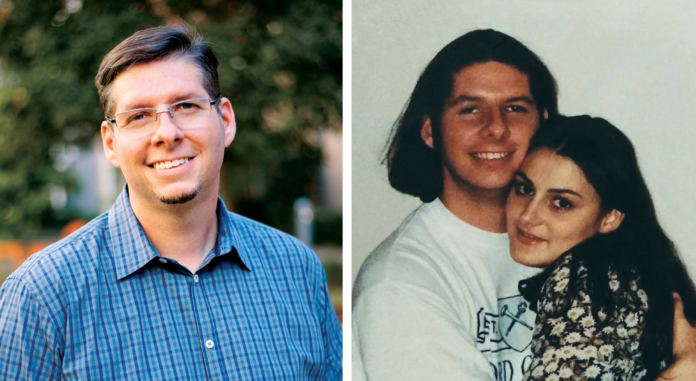Get to know Mercer University‘s faculty members a little better through our “Faculty Flashback” series. Some of our professors will be sharing personal and professional details of their lives in a Q&A as well as then-and-now photos from today and their college days.
Dr. David A. Davis has worked at Mercer for 13 years and is the director of Fellowships and Scholarships and an associate professor of English. He earned a bachelor’s degree in English and philosophy at Emory University in 1997 and a Ph.D. in American Literature at the University of North Carolina-Chapel Hill in 2006.
1. What advice, related to life or college, would you offer students at Mercer now?
Ask for help. In any four-year period, a person is likely to encounter a crisis of some kind. For college students, a crisis can potentially derail their academic progress, and students who have high financial need or who are first-generation students are vulnerable to leaving college when they encounter an obstacle.
Don’t let that happen to you. Every person who works at Mercer is invested in your success. Build a network of friends, find a mentor and take advantage of the people here who can offer assistance. We have staff members who can help with almost any kind of crisis — academic, health, financial, personal or spiritual. Successful students get help when they need it.
2. What is something you wish you knew in college that you know now?
Plans change. I went to college intending to pursue a specific career path, but I found other interesting opportunities that led me in a different direction. If I had been unwilling to change my plans, I wouldn’t have found my path.
I often meet students who have a fixed intended trajectory who feel confused or frustrated when they find their plans deviating from what they expected to do. College is the ideal time to explore options and new possibilities, so I think it’s better to embrace these experiences.
In particular, I encourage students to take a gap year before graduate or professional school. I didn’t initially plan to take time away before graduate school, but I did, and it proved to be very productive. Consider getting a job, joining the Peace Corps, doing a Fulbright, or teaching abroad before applying to graduate or professional school. You’ll learn more about yourself and be a stronger applicant.
3. What made you want to join the team at Mercer?
I was teaching at Wake Forest when I learned that Mercer was hiring a specialist in Southern literature. Mercer has hosted the Lamar Lectures in Southern History and Culture for more than 60 years, so the University has a prominent reputation in Southern studies. I was excited about the opportunity to join the program here, so I applied.
I’m so happy that I did. I have phenomenal colleagues in Southern studies, and I’ve been able to teach some courses that I enjoy, such as Southern food, Flannery O’Connor and Southern autobiography. My colleagues and I have developed an exciting series of events, and our work has developed into the Spencer B. King Jr. Center for Southern Studies.
4. What do you love most about your work?
That’s easy — my students. I enjoy getting to know all of my students, and I often have students take more than one class with me, so I get to see their growth and development over time. As director of Fellowships and Scholarships, I also get to work with accomplished students from across the University, and I enjoy working with them on applications. I find it gratifying to help them find ways to describe themselves on paper.
Many of my students have become good friends. I keep in touch with some former students on social media, and I enjoy seeing them go on to careers, relationships and accomplishments. Nothing makes a professor prouder than a student’s success.
5. What are some of the projects/accomplishments you’ve been most proud of in your career so far?
I have worked with my colleagues to create several programs that enhance the student experience. Dr. Kevin Bucholtz, Dr. Tom Scott, Dr. Fletcher Winston and I established an undergraduate research symposium that developed into BEAR Day. I collaborated with my colleagues in Southern studies, Dr. Sarah Gardner and Dr. Doug Thompson, on a successful NEH (National Endowment for the Humanities) grant that led to the King Center, and I had the support of Southern studies, the Office of Admissions and the College of Liberal Arts and Sciences to create the Thomas Robinson Prize for Southern Literature.
I am extremely proud to have been involved with Mercer’s chapter of Phi Beta Kappa, the nation’s oldest and most prestigious academic honor society. Dr. Jeff Denny and I wrote Mercer’s successful application to shelter a chapter, and we worked together with our Phi Beta Kappa colleagues and University administration to install the chapter. I’m now president of the chapter, and I love participating in the process of selecting students, especially going to their classes to notify them of their selection.
This is a wonderful University, and I’m so fortunate to work with these colleagues and to teach these students.










